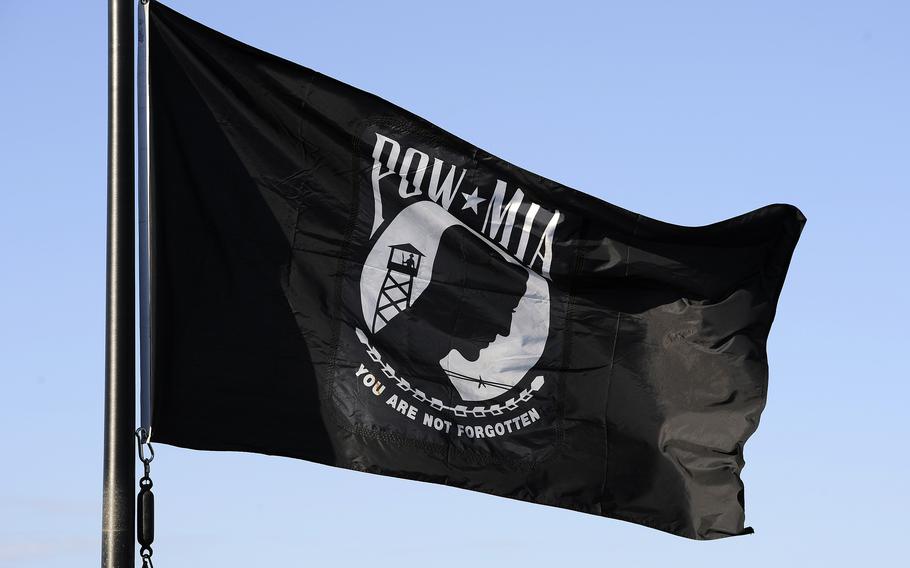
A POW/MIA flag flies over Schriever Air Force Base, Colo., Sept. 4, 2014. (U.S. Air Force)
(Tribune News Service) —While serving in the Philippines during World War II, U.S. Army Air Corps Pfc. Glenn Harris was captured, forced to walk in the Bataan Death March and held as a prisoner at a camp more than 7,000 miles away from his home on the Central Coast.
He would never return to California — until now.
Only a few months after his capture, the 26-year-old Monterey County native died and was buried in one of the camp’s mass graves. For years, his body lingered overseas, one of the more than 2,700 people who had been buried at the camp — just under half of whom remained unidentified for decades.
Now, more than 80 years after his death, the fallen soldier is finally coming home.
Thanks to the efforts of the Department of Defense’s POW/MIA Accounting Agency, Harris’s remains were finally identified in July using a combination of DNA and other evidence, according to an agency news release.
Now Harris is expected to be laid to rest in a ceremony at Pleyto Cemetery in Bradley, just north of San Miguel, on Sept. 30. Paso Robles’ Kuehl-Nicolay Funeral Home will perform graveside services preceding the interment.
WWII Central Coast soldier died after Bataan Death March, buried in prison camp
According to the agency, Harris was one of thousands of United States and Filipino service members who were captured and held at prisoner of war camps when United States forces in Bataan fell in the spring of 1942.
Harris was serving in the Air Force’s 93rd Bombardment Squadron, 19th Bombardment Group, when Japanese forces invaded the Philippine Islands in December 1941. After months of intense fighting, the peninsula was surrendered in April 1942
The captured service members were forced on the 65-mile Bataan Death March, and then held at Cabanatuan Camp #1, which according to the Accounting Agency, “consistently served as the single largest camp for U.S. prisoners for the duration of the war, housing as many as 10,000 prisoners.”
Death rates were incredibly high at Camp #1, with some estimating that two out of every three prisoners taken captive on Bataan died due to injuries and poor health, according to the Accounting Agency.
Prison camp and other historical records indicate Harris died July 26, 1942, at the end of what would be the deadliest month at the camp, when 799 U.S. prisoners perished there.
Harris was buried in Common Grave 225.
After the war, the bodies buried in the camp cemetery were exhumed by the American Graves Registration Service and relocated to a temporary military mausoleum near Manila. There, the agency began a concerted effort to identify all of the unidentified remains of those buried at the camp.
Three sets of remains from Common Grave 225 were identified in 1947, but the rest — including Harris’ — were declared unidentifiable. They were buried at the Manila American Cemetery and Memorial as unknowns.
DNA helps identify service member’s remains 80 years after death
For 70 years, the American Battle Monuments Commission would care for the remains of those unknown servicemembers at the Manila cemetery.
Then, in March 2018, the remains were disinterred by the Accounting Agency and sent to a laboratory at Joint Base Pearl Harbor-Hickam, Hawaii, for analysis.
On July 7, Harris was finally accounted for, according to the release, after his remains were identified “using circumstantial evidence as well as anthropological, mitochondrial DNA, Y-chromosome DNA and autosomal DNA analysis.”
Harris is one of a handful of those buried in Common Grave 225 to be identified in the latest effort.
Air Force Pvt. Joseph E. Lescaut, of Cambridge, Massachusetts — who was buried the same day as Harris — was identified in December 2022, and Army Cpl. Leo. J. Barlosky was identified in June.
According to an obituary shared by Kuehl-Nicolay Funeral Home, at the time of his death, Harris left behind four brothers: Clifford, Forrest, Wayne and Dale, as well as one sister Dorothy (Harris) Bilyeu and several nephews.
Harris’ burial will begin with a private family gathering, followed by a public ceremony at 10:30 a.m. and procession at 11 a.m. from the Paso Robles funeral home to Pleyto Cemetery near Lake San Antonio.
To learn more about the Department of Defense’s mission to account for Americans who went missing while serving, visit the DPAA website at dpaa.mil, facebook.com/dodpaa, or call 703-699-1420.
(c)2023 The Tribune (San Luis Obispo, Calif.)
Visit The Tribune (San Luis Obispo, Calif.) at www.sanluisobispo.com
Distributed by Tribune Content Agency, LLC.